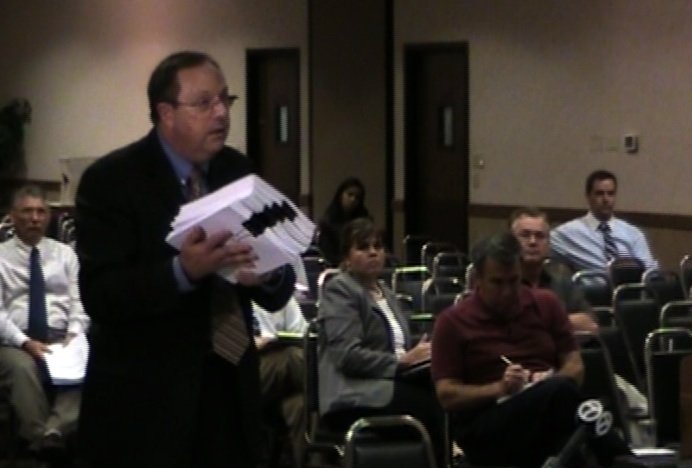NORTH LITTLE ROCK — UPDATE
The Arkansas Scholarship Lottery commission on Thursday unanimously approved a new set of rules allowing tickets to be sold through vending machines.
Jerry Cox, president of the Family Council, said afterward his group would ask the lottery's legislative committee to take action to stop the machines from being implemented. If that doesn't work, the group will work to pass a law in the next legislative session outlawing them, Cox said.
Cox was one of more than 20 people who spoke out against the machines at a public comment prior to the vote.
The commission voted in favor of the machines after making two small changes to the proposed set of rules outlining how they will work. Language was introduced to specifically require a government-issued identification card to buy a ticket through one. Such identification was always going to be necessary, but the rules didn't explicitly say so, commissioners said.
The second change shifted the rules so the machine must be placed in an area of a store that is staffed. It previously read "normally staffed."
PREVIOUSLY
Speakers almost exclusively voiced opposition to lottery vending machines at a public comment session Thursday on the devices, which the Arkansas Scholarship Lottery is pushing to have installed in retail locations.
Only two out of 23 speakers at the hourlong session at the Wyndham Hotel spoke in favor of the machines, and one of those said he reversed his initial opposition only after hearing from retailers who favored them over countertop sales.
Lottery officials have estimated 100 lottery vending machines placed in stores that don't sell tickets over the counter could generate $5 million a year for scholarships.
Tara Bond, of Sherwood, said she began smoking cigarettes when she was 13, obtaining them from a hotel vending machine and even waving to the lobbyist as she left.
"It was that easy," Bond said, telling lottery commissioners it took her nearly a decade to quit smoking. "... This is a huge concern of mine. The government enabled my addiction by allowing the vending machines. You will be doing the same with the lottery ticket vend machines."
James Cohen, of Clarendon, said the machines might become dangerous, particularly in poorer areas where users might be targeted and robbed.
He said the lottery in general negatively affects the poor.
"There's people selling food-stamps for half price, just to play y'alls game," he said.
Reg Hamman, of North Little Rock, said he feared vending machines would do little to stop underage people from buying tickets and pointed out that no such machines exist to sell alcohol.
"The reason we don't have those is that we cannot trust young people under the age of 18 to make wise, intelligent decisions," Hamman said. "There's vending machines for cigarettes gathering rust right now because they did not work. ... A vending machine is not going to protect a young person."
Several people questioned the lottery's methods, pointing out that machines have already been purchased and suggesting the decision process should have been more transparent.
Doug Jones, of Hot Springs, described the lottery commission as a "horde of sharks" smelling blood in the form of more money. He accused the group of engaging in "back-room dealings" and said the whole process has been questionable.
"It appears that there's been a shroud of secrecy around this," he said.
David Dinwiddie, of Pine Bluff, said he supported the lottery machines because retailers want them but that he opposed technology that would read driver's licenses. He said he doubted it would work well.
Several others said they questioned whether such a measure would prevent young people from buying tickets.
The one outright supporter of the machines, Little Rock resident Loretta Lever, said she believed the machines will increase scholarships, which in turn betters the education of the Arkansas workforce.
"I see this as an economic development ripple effect," she said.
This story was originally published at 2:43 p.m.

